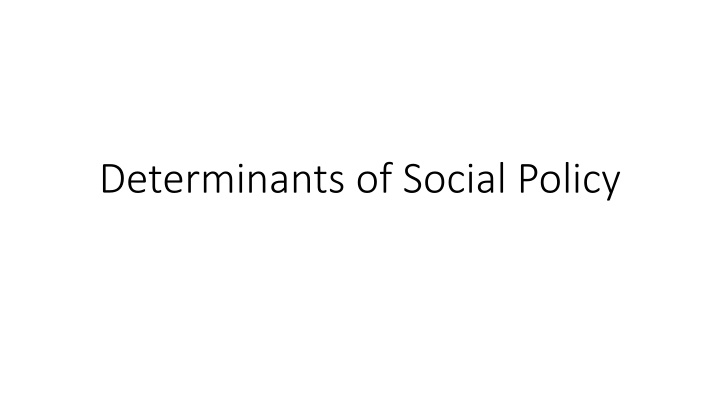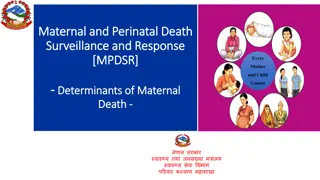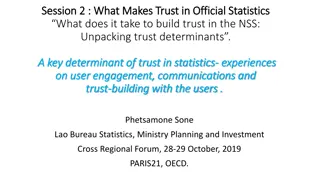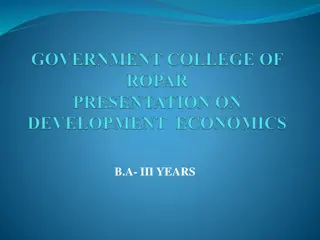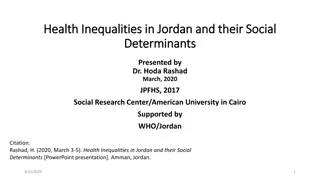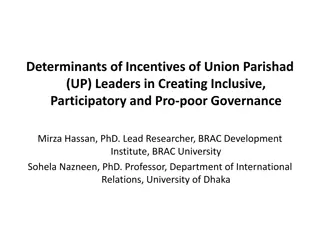Key Determinants of Social Policy Development
Social policy is shaped by various determinants such as economic factors, cultural values, political aspects, family systems, and international consultants. Economic conditions, cultural norms, political stability, family structures, and global influences all play a crucial role in formulating social policies to address societal needs and promote well-being. Understanding these determinants is essential for effective policy development and implementation.
Download Presentation

Please find below an Image/Link to download the presentation.
The content on the website is provided AS IS for your information and personal use only. It may not be sold, licensed, or shared on other websites without obtaining consent from the author.If you encounter any issues during the download, it is possible that the publisher has removed the file from their server.
You are allowed to download the files provided on this website for personal or commercial use, subject to the condition that they are used lawfully. All files are the property of their respective owners.
The content on the website is provided AS IS for your information and personal use only. It may not be sold, licensed, or shared on other websites without obtaining consent from the author.
E N D
Presentation Transcript
Social policy generally implies to improve those services which are already available in the society and to provide those services which are lacking in the society. When we make a policy we study the society and come across different factors or forces to determine the policy. These factors are called determinants of social policy. These are as under:
Economic Factor Economic Factor More than half of the population lives in the countries where the income per head is very low. People suffer from poverty and hunger. Every state, in particular, tries to minimize the inequality in income, status, facilities and opportunities, not only amongst individuals but also amongst groups of people residing in different areas of the country. Thus the primary aim of social policy is to make people prosper and promote their well-being and social policy is determined by observing the economic conditions of the country.
Cultural Values Cultural Values The norms, values and cultural aspects of any country have significant effects on the people and majority of the people are orthodox, superstitious, rigid and conventional. It is firmly established that social development is not a by-product of economic growth only. Economic growth and social change together came to be regarded as two aspects to the process of development. People participate only if national development plans are relevant with their cultural aspects.
Political Factor Political Factor In third word countries, mostly governments change from time to time and every new government cease implementing each program of its predecessors at once. A stable government is a rich government whereas an unstable government will have no investment, so cannot provide any service. So the government priorities are important determinants of social policies.
Family system Family system Nuclear family system needs more institutionalized services to look after its dependents, such as children, aged, sick, disables etc. social policy is made according to the needs of the society. So establishment of child day care centers, old age homes and homes for destitutes women etc., are considered in social policy.
International Consultants International Consultants International consultants are the advisors to the host countries who educate and nurture their ideas and experience. They introduce new technology and thoughts. By seeing the advantages of new ideas, host countries want to introduce such things in their own country, so they make new and more effective policies.
Other determinants are: Other determinants are: Public Opinion Socio-economic problems industrialization, urbanization, modernization, working class mobilization, union strength expert knowledge; existing domestic and international research; existing statistics; stakeholder consultation; evaluation of previous policies and new research Priorities in political and development terms, openness to international influences (of all sorts); Resources likely to be available to policy makers Who can participate in policy and how. Specific events, especially traumatic events that demand a political response. This includes both natural disasters and anthropogenic events (sudden changes in market conditions, wars). Structure and capabilities of formal institutions such as central government agencies, local government, NGOs, the private sector, political parties External influences: Donors, international agreements and treaties, and external media.
